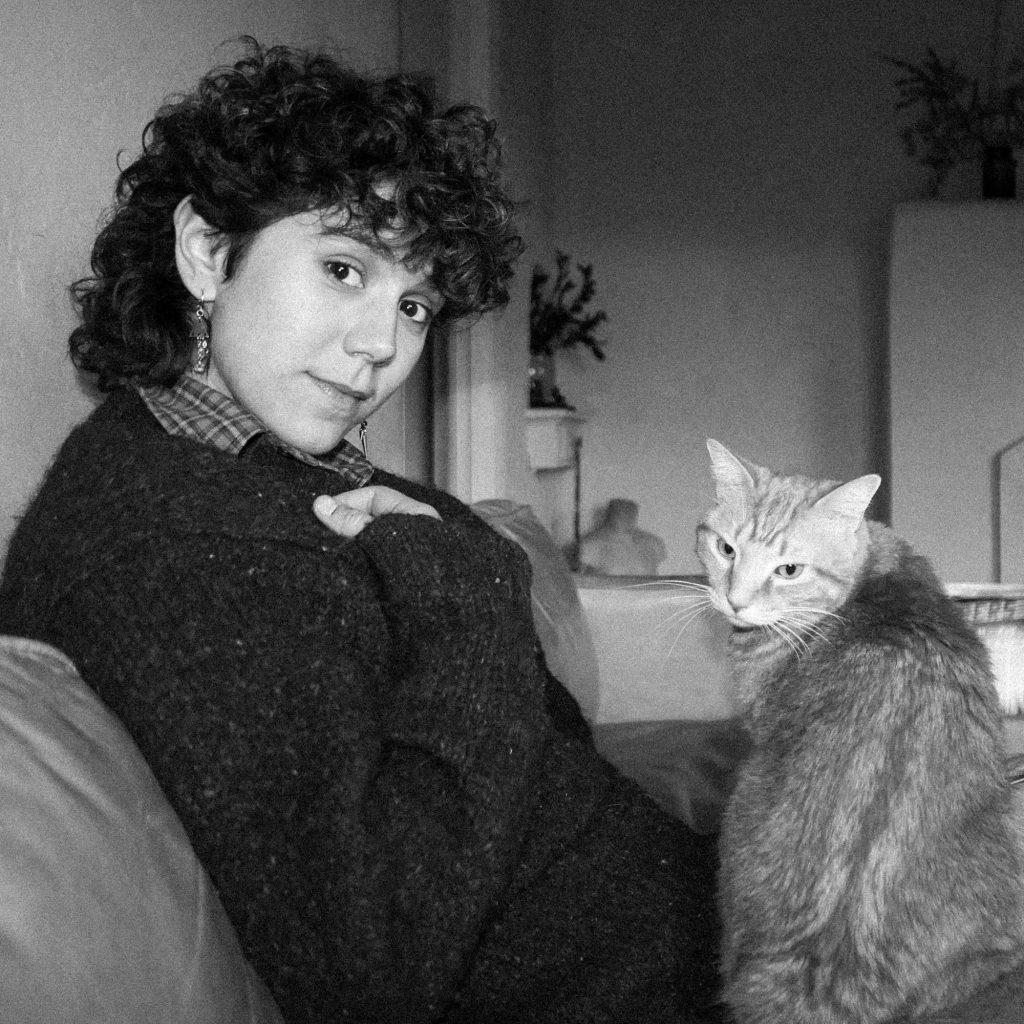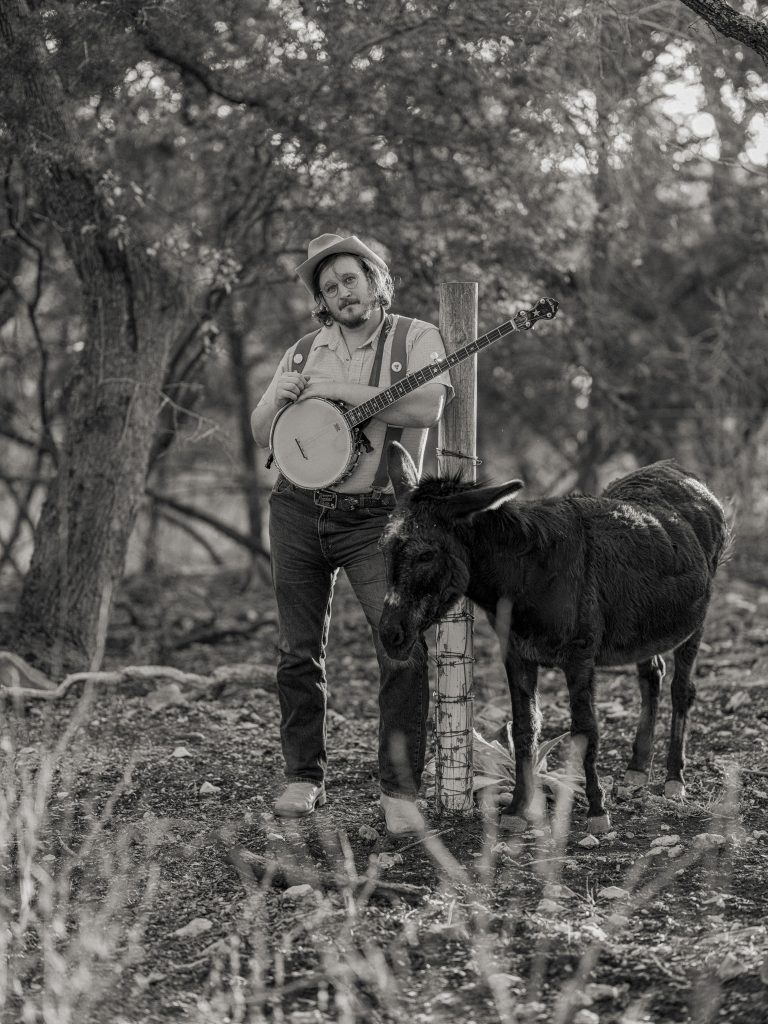
Folksinger Willi Carlisle holds tight the conviction that love is bigger than hate, and no-one is expendable. Carlisle’s music has always been a dance between absurdity, spectacle, and philosophy. On his fourth studio album, Winged Victory, Carlisle returns with his signature blend of traditionally-rooted folk music and kaleidoscope of oddball characters to confer with his core tenets in more overt and provocative ways.
“These songs feel poised on the edge of the apocalypse, or at least at the beginning of a great transformation in America,” Carlisle says. “During this borrowed time, the weirdos, cowboys, and dreamers in these songs dare to love, and often pay for it with blood.” Carlisle delivers Victory as the next chapter in his long-running direct address to the hope that by understanding our collective suffering, we might be free of it. He’s intent on creating art and a well-rounded life in a broken world. The idea began with 2022’s Peculiar, Missouri when Carlisle proclaimed “your heart’s a big tent, everybody gets in.” After gathering together all the world’s weirdos and misfits under the big tent, with 2024’s Critterland, Carlisle let them loose into the world. Now, on Winged Victory, they speak for themselves, unencumbered by social expectations.
Victory, Carlisle’s first self-produced album, will be released June 27 via Signature Sounds. It both indulges several of his wildest dreams and feels like the inevitable sequel to Critterland’s charismatic menagerie of chaos. Though occasionally raunchy, and routinely provocative, Victory is not afraid to make a spectacle for the sake of a point. Victory should be understood as a reflection. It revels in the beauty of tiny, monetarily-worthless moments and things, offering with them a consideration of our innate humanity. To set the stakes of the story, Carlisle opens with a cover of protest song “We Have Fed You All for 1000 Years.” Written by an unidentified Industrial Workers of the World member (IWW) for an early union strike, the song lays out one of the many ways the working class sustains the world.
“I can think of no better way to set the terms of any argument that I’m going to make than, ‘if, blood is the price of your cursed wealth/ by God, we’ve paid in full,’” Carlisle says, quoting the song. “I love that it’s a voice from time immemorial that is singing out about one of the oldest issues in all of history. These stories are almost always written by the victor, but here is a rare exception–a possibility.”
Carlisle has a knack for delivering a message through absurd scenes. To his eccentric cohort of weirdos and misfits, he adds a donkey named, ‘Winged Victory,’ on the album’s title track. Carlisle thought that to name a donkey a high classical concept like ‘Winged Victory’ seemed so illogical and wonderful at the same time that he bestowed the same name on his album, as well. On “Winged Victory,” Carlisle pits the full force of his convictions against any allegiance to relentless progress at all costs. “They say progress is a fact of earth / that rhetoric’s as dumb as dirt / I don’t want to work a dead-end job / a penny saved a penny lost,” he sings. Instead, Carlisle sings of joyful moments whose incongruity and humanity demand recalibration. “I believe in the impossible / that no-one is expendable.” The romp concludes in a dementia ward where Carlisle is surprised to hear the old folks singing back at him. Long after memories fade, music remains rooted within the human mind.
On previous albums, Carlisle’s delivered big concepts in quick succession, but with Victory he built in what he calls “pressure release valves”: calm, sweet moments of relief. The first of these is the album’s second track, “Wildflowers Growin,’” a gentle reminder to stop and appreciate the world’s small wonders. Elsewhere on the album is Carlisle’s first song about childhood: “Cottonwood Tree,” a sentimental frolic through nostalgia and what it takes to be free. Later, he indulges in 51 seconds of instrumental polka music (“The Cottonwood Polka”) riffing on the melody from “Cottonwood Tree”.
Among the dreams Carlisle realized on the album was the presence of as many types of squeezeboxes as he could — four, this time — and equally four banjos, as well as assorted brass instruments. Carlisle also included his cover of “Beeswing,” a folk song about great and lost love by Richard Thompson; and he recorded two songs he’s carried with him for a long time, “Crying These Cocksucking Tears,” and “Big Butt Billy.”
The first is a song by queer country icon Patrick Haggerty. Haggerty’s music intended to disrupt the status quo. Carlisle’s version of “Cocksucking Tears” is a carefully-calibrated satire, which sounds something like a free-for-all deconstructed psychedelic circus band. Carlisle took on Haggerty’s extraverted lyrics to skewer toxic masculinity and homophobia, and added a verse of his own.
Further playing around with cloying gender norms, Carlisle penned “Big Butt Billy,” the latest installment in his growing catalogue of outlandish tales delivered in lightning-fast rhyming talkin’ blues songs. “Big Butt Billy” is an unapologetically bawdy and funny first-person narration by a trucker discovering his sexuality while ogling a nonbinary server at a road-side diner.
Repeatedly on Victory, Carlisle invites listeners to pause and consider the state of things. To that end, he delivers his sharpest points back-to-back mid album: “Work is Work” and “Sound and Fury.”
“Did you heed the call? Were you led astray? / Work is work, or it wouldn’t pay,” Carlisle sings in “Work as Work.” In it, together with “Sound and Fury,” he imagines grace free from the haints of meaningless production and profit. Then, with the album’s final track —a cover of folk singer Mark Ross’ “Old Bill Pickett” about the legendary Black cowboy — he delivers the clincher: victory comes through sharing our collective histories so we can better understand where we’re from, and where we’re going.
“A good folk music response to the troubles of the First World is saying ‘what are the little things that we can do … where can we move the needle?’” Carlisle says. Victory is a salve for the chaos and pain of a messed up world. A salve— not intended to alleviate, but to relieve, briefly. If all else fails, and the world seems to be coming apart at the seams, remember that wildflowers still grow free.

Olive Klug
While only a relatively short time since the van-dwelling singer-songwriter Olive Klug has fully
pursued the nontraditional life of a touring musician, their sophomore album Lost Dog finds
them contemplating a propensity for adventure no matter what avenue of love and loss it leads
down. Although still very young, on Lost Dog Klug artfully addresses “aging as a neurodivergent
free spirit” on the road with an unarguably talented ability to fearlessly voice deeply honest
emotions through captivating storytelling.
Gentle at the start, album opener “Taking Punches From the Breeze” gets its title from Klug’s
self-described nature of “letting the wind take them wherever they’re meant to be.” As more
instrumentation fills in alongside fingerpicked guitar and Klug’s soft croon, a shuffling drum beat
arrives under lyrical imagery of life’s new direction and the ups and downs of being beholden to
the breeze.
Deemed by Klug as “the happiest song you’ll ever hear about unrequited love,” “What to Make
of Me” is a “zydeco-inspired romp” so full of life and self-assuredness that there’s hardly room
to dwell on anything remotely devastating. Pure unshakeable confidence clocking in at just
under three minutes, this tune is much like the short-term romance that inspired it with the
added benefit of being able to listen on repeat.
“No one is their best self in the first few weeks following a big breakup,” explains Klug. “And the
song ‘Cold War’ demonstrates how this manifests in our modern world.” Poignant and precise,
the stark recording of guitar, bass, haunting strings and vocals accentuate a very twenty-
something realization on ended relationships and the proclivity to stalk the internet thereafter:
“The cold war has begun
Of who can prove that they’re having the most fun,
Through tiny screens and Spotify streams
Trying to prove to the other that we won”
“The song shows us parts of ourselves we might not always be proud of,” says Klug. “But can
undeniably relate to.”
A “take on Paul Simon’s wordy magical chaos,” “Train of Thought” is an experimentation into
the world of abstract metaphors compared to Klug’s usual literal storytelling style. On the
surface the fun and frolic of wordplay and rhythm are countered by the personal meaning to
Klug, and letting the listener in to what it’s like to be neurodivergent and how they have “recently
embraced the internal chaos instead of trying so hard to control and repress it.” Additionally,
lines like “and they try to button up my suit and tie in an attempt to hold me back but I’m this
strange old conductor wearing pearls and a backwards baseball cap” highlight how their
“nontraditional gender presentation is intrinsically linked to this neurodivergence and desire to
resist societal pressures.”
The “fast-paced folk punk anthem” “Opposite Action” creatively puts Klug’s “under-utilized
psychology B.A” to use – taking a therapeutic concept for a song name and putting its practice of
encouraging “patients to do the opposite of what their emotions are telling them to do” in the
chorus. Frustrated after applying these methods and not attaining immediate results during a
depressive episode in the summer of 2023, Klug’s stream of consciousness style verses offer
emotional release and the recognition that getting older and more responsible can feel like an
inner-battle when the old patterns want to “give into the worst of me sometimes.”
Slowing down the tempo, “Lost Dog” is a melancholic examination of lifestyle choices. “It’s
about watching your peers settle down into serious relationships and buy houses and wonder if
you made the right decision to choose freedom and independence,” says Klug. “It’s about
learning that the other side of the freedom/independence coin is often instability and loneliness.”
Klug carefully acknowledges that their career can be captivating to many as “a wanderer’s
lifestyle,”but others’ admiration can quickly turn to contempt as they age – a feeling expressed
through the track’s titular metaphor in the chorus.
Revisiting the same break up depicted in “Cold War,” the minimalist ballad of “One Dimension”
harnesses the healing power of hindsight. “With more time to process,” explains Klug. “It’s much
easier to come to terms with the nuance in a relationship and recognize that the anger and
vengeance that first arise after a breakup are often a coping skill for processing the real
sadness and loss of cutting ties with someone you were once vulnerable enough to share your
life with.”
Already serving as a special moment in Klug’s live set, Lost Dog ends with the enchanting and
existential “Fleeting.” Reflecting on the complexities of connection, this swaying track is
enhanced by crowd participation on the lullaby-like chorus “it’s fleeting, I’m better when I’m
leaving” – a sung mantra between artist and audience of appreciating the present when
departure is imminent.
Lost Dog was produced and engineered by Isaiah Beard (Jobi Riccio) and recorded at Club
Roar in Nashville, TN.



